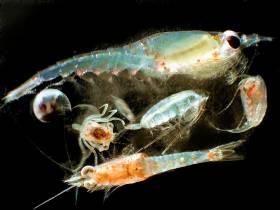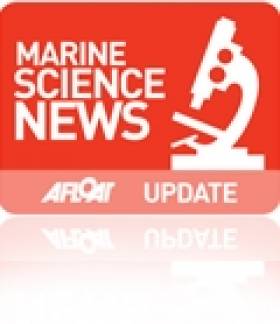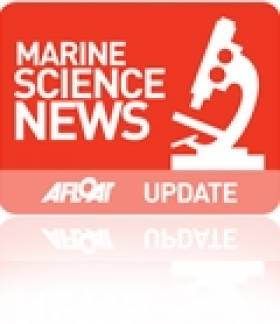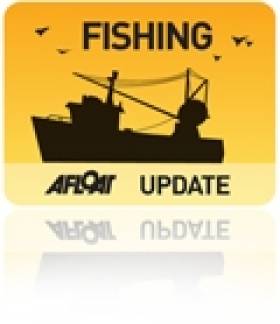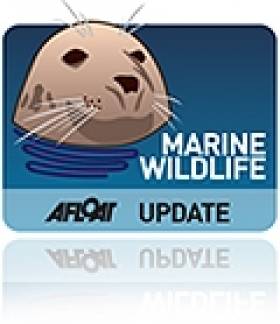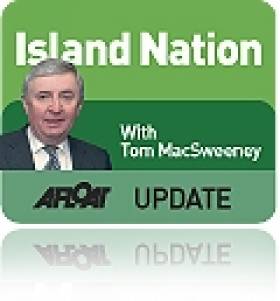Displaying items by tag: plankton
Study Links Seismic Surveys To Ocean Plankton Mortality
#MarineScience - New research raises questions over “significant disruption” to microscopic marine wildlife by seismic surveys — leading to calls for the Government to take notice.
According to The Irish Times, Lorcán Ó Cinnéide of the Irish Fish Processors’ and Exporters’ Association says the findings by researchers in Australia could explain anecdotal claims of reduced fish stocks in areas off the Irish coast where seismic surveys for oil and gas have taken place.
The new study, by marine scientists at the University of Tasmania and Curtin University, found that the air gun signals commonly used in seismic surveys of the seabed caused up to a 300% increase in ocean plankton deaths in the waters off Tasmania.
“Plankton underpin whole ocean productivity,” the study’s lead author Prof Robert McCauley said. “Their presence impacts right across the health of the ecosystem so it’s important we pay attention to their future.”
The Irish Times has more on the story HERE.
Get Involved With 'Secchi Disk' Global Plankton Survey
#MarineScience - The team behind one of the world's biggest studies of ocean plankton have renewed their drive to encourage participation by all manner of seafarers.
As reported earlier this year on Afloat.ie, the Secchi Disk project involves the use of an special apparatus, a 30cm-wide flat white disk attached to a tape measure or rope and weighted by a small weight that's dropped off the side of a vessel.
Mariners then observe the disk as it drops, and when it disappears from view that level is known as the Secci Depth, a measure of the turbidity of the water - which in turn is influenced by the amount of microscopic marine wildlife present.
Seafarers in British and Irish waters - sailors, fishermen and yachtsmen alike - can then contribute their measurements via the Secchi App for smartphones to help researchers build a more complete picture of phytoplankton activity in our oceans and measure their changes over time.
Full details of the project and how to take part are available via the Plymouth University website HERE.
Researchers Ask For Help In Global Plankton Survey
#MarineScience - Researchers at a UK university are hoping to enlist seafarers to help conduct one of the world's biggest studies of ocean plankton.
BBC News reports on the project by the Marine Institute at Plymouth University, which hopes to encourage fishermen and sailors alike to take part in its survey in Britain's coastal waters - including the Irish Sea - and far beyond.
Anyone participating in the study must drop off the side of their vessel an apparatus called a Secchi disk - a 30cm-wide flat white disk attached to a tape measure or a rope, and weighted from below by a small 200g weight.
When the disk disappears from view, that level is known as the Secchi Depth, which measures the turbidity of the water, which in turn is influenced by the amount of the microscopic marine wildlife in the water column.
Seafarers are being asked to record the Secchi Depth and upload to researchers via a mobile app for iOS and Android devices in order to build a complete picture of plankton activity in the world's oceans.
"If we can just get a small percentage of the global population of sailors involved, we can generate a database that will help us understand how life in the oceans is changing," said project leader Dr Richard Kirby.
"It would help us learn much more about these important organisms at a crucial time when their habitat is altering due to climate change."
BBC News has more on the story HERE.
Wild Salmon Showing Signs of Adapting to Climate Change
New evidence is indicating that wild salmon are adapting to climate change by feeding in colder waters, The Irish Times reports.
According to salmon expert Dr Ken Whelan, wild salmon are now diving as far as 800m below the surface - normally the preserve of the sperm whale - to feed for periods of up to 24 hours during winter months.
They are also travelling closer to the polar ice fields, in response to the warming of the Atlantic Ocean.
The change in behaviour was noted at a salmon summit in France attended by more than 100 fishery managers and scientists from across Europe, which was convened to discuss the threat of climate change to wild salmon stocks at sea.
Plankton levels are particularly affected by the changing wind and ocean currents, said Dr Whelan of findings from the EU-funded Salsea programme, which he led.
“Surviving the first winter at sea seems to be the key challenge for these stocks, and the salmon in the northern states like Norway and Russia, seems to be less affected,” he said.
But the recent return of wild salmon to the Tolka in Dublin, as well as healthy numbers along other inland waterways, highlighted that the news was not all doom and gloom.
The Irish Times has more on the story HERE.
Basking Sharks Pay Early Visit to Ireland's Waters
The recent warm weather has attracted scores of basking sharks to feed in Irish waters weeks ahead of schedule, Metro reports.
Video posted on YouTube by mackerel fishermen in Donegal Bay shows one of the sharks - the second largest species in the big fish family - just metres from their boat:
"We saw about 20 basking sharks that day," fisherman Brian Smith told Metro. "I have never seen so many at this time of year. You don't usually see them until later in May time."
Despite their fearsome size, basking sharks are among the friendlies of Ireland's marine wildlife.
They feed only on plankton and tiny fish - sifting them through their enormous gaping jaws - and are known for their calm temperament.
Living Beyond Our Means
That is not a title referring to the current economic situation, though it is certainly apt in that regard. I am using it to refer to the fact that as humans we live on relatively small pockets of land on this planet that is dominated by the oceans upon which we depend for life. So much damage is being done to those oceans that 600 marine scientists this week issued a sombre warning:
"It is well past the time to get serious about measuring what is happening to the seas around us."
I was looking this week at an interesting sight, an image of the Earth taken from outer space in which our planet appears as a globe, dominated by a huge drape of blue hues broken up by irregular patches of brown and green, with swirls of grey and white above them. The blue are the oceans, the patches of brown and green the land and the swirls of grey and white the clouds. It made me think that, if life had evolved on another planet and scientists from there were looking at Earth, they would see it as a water planet, dominated by the oceans which cover over 70 per cent of its outer surface.
The oceans are what set Earth apart from other planets in the solar system. They contain over 324,126 cubic miles of water, an enormous quantity of liquid upon which life on the planet depends. We humans, who lack the ability to live totally in water, who do not possess the gills with which marine life is equipped, who are land-bound, air-breathing organisms, have forgotten how unrepresentative is our perspective of land in relation to the oceans. They occupy two-thirds of the world on which we humans live and which we believe was made for us. Yet, there is much more life in the seas. Isn't that an interesting thought, particularly as human life continues to abuse the oceans?
POGO is an organisation linking 80 per cent of the world's institutions studying the oceans. The "Partnership for Observation of the Global Oceans" was created by leaders of the world's major oceanographic institutions. One of its major aims is to reach out to the public, creating more awareness of the seas. It has now established 'Oceans United,' an international forum intended to become 'The Voice of the Oceans,' sharing observations, knowledge and information for the benefit of humanity which depends for its continued existence on the survival of the oceans.
The 600 marine scientists who issued that sombre warning are members of 'Oceans United.' They have called for an integrated global ocean observation system which would monitor the entire ocean surface:
"The situation is that serious. Every country in the world needs to unite, irrespective of their differences, because the ocean surface is now more acidic than ever before and this will affect life on our planet."
The danger from this rising trend is that it will affect the basis of life in the sea – the plankton which are at the base of the global marine food chain. This is not a remote, ethereal issue. Scientists are concerned that the origins of recent world catastrophes such as the floods in Pakistan and summer heat waves and forest fires could be traceable to effects on the oceans as they grow saltier, hotter, more acidic and thus less biologically diverse.
• This article is reprinted by permission of the EVENING ECHO newspaper, Cork , where Tom MacSweeney writes maritime columns twice weekly. Evening Echo website: www.eecho.ie


























